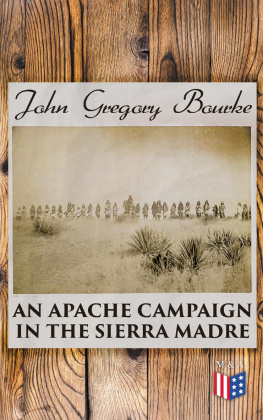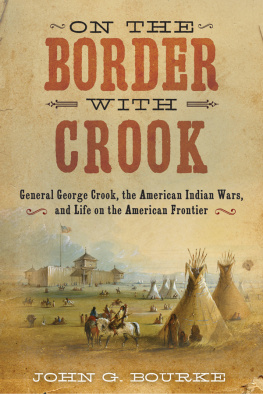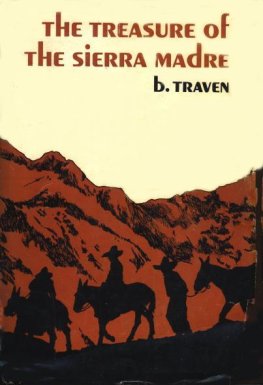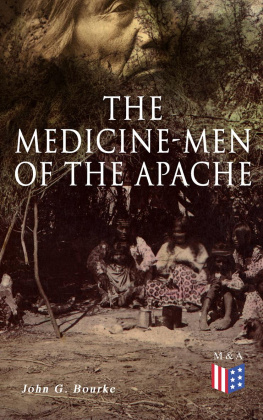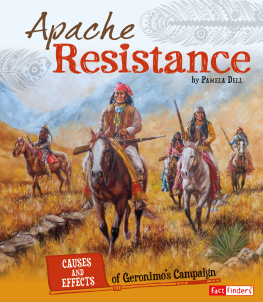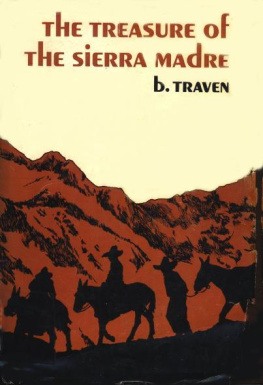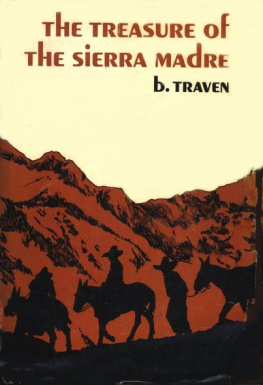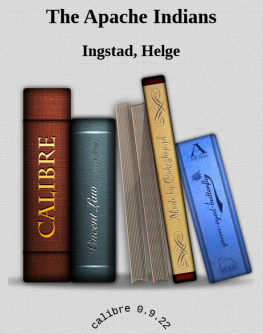John Gregory Bourke
An Apache Campaign In The Sierra Madre
Madison & Adams Press, 2021
Contact:
EAN 4064066384180
This is a publication of Madison & Adams Press. Our production consists of thoroughly prepared educational & informative editions: Advice & How-To Books, Encyclopedias, Law Anthologies, Declassified Documents, Legal & Criminal Files, Historical Books, Scientific & Medical Publications, Technical Handbooks and Manuals. All our publications are meticulously edited and formatted to the highest digital standard. The main goal of Madison & Adams Press is to make all informative books and records accessible to everyone in a high quality digital and print form.
PREFACE.
The recent outbreak of a fraction of the Chiricahua Apaches, and the frightful atrocities which have marked their trail through Arizona, Sonora, New Mexico, and Chihuahua, has attracted renewed attention to these brave but bloodthirsty aborigines and to the country exposed to their ravages.
The contents of this book, which originally appeared in a serial form in the Outing Magazine of Boston, represent the details of the expedition led by General Crook to the Sierra Madre, Mexico, in 1883; but, as the present military operations are conducted by the same commander, against the same enemy, and upon the same field of action, a perusal of these pages will, it is confidently believed, place before the reader a better knowledge of the general situation than any article which is likely soon to appear.
There is this difference to be noted, however; of the one hundred and twenty-five (125) fighting men brought back from the Sierra Madre, less than one-third have engaged in the present hostilities, from which fact an additional inference may be drawn both of the difficulties to be overcome in the repression of these disturbances and of the horrors which would surely have accumulated upon the heads of our citizens had the whole fighting force of this fierce band taken to the mountains.
One small party of eleven (11) hostile Chiricahuas, during the period from November 15th, 1885, to the present date, has killed twenty-one (21) friendly Apaches living in peace upon the reservation, and no less than twenty-five (25) white men, women, and children. This bloody raid has been conducted through a country filled with regular troops, militia, and rangers,and at a loss to the enemy, so far as can be shown, of only one man, whose head is now at Fort Apache.
JOHN G. BOURKE.
Apache Indian Agency,
San Carlos, Arizona ,
December 15th, 1885.
I.
Within the compass of this volume it is impossible to furnish a complete dissertation upon the Apache Indians or the causes which led up to the expedition about to be described. The object is simply to outline some of the difficulties attending the solution of the Indian question in the South-west and to make known the methods employed in conducting campaigns against savages in hostility. It is thought that the object desired can best be accomplished by submitting an unmutilated extract from the journal carefully kept during the whole period involved.
Much has necessarily been excluded, but without exception it has been to avoid repetition, or else to escape the introduction of information bearing upon the language, the religion, marriages, funeral ceremonies, etc., of this interesting race, which would increase the bulk of the manuscript, and, perhaps, detract from its value in the eyes of the general reader.
Ethnologically the Apache is classed with the Tinneh tribes, living close to the Yukon and Mackenzie rivers, within the Arctic circle. For centuries he has been preminent over the more peaceful nations about him for courage, skill, and daring in war; cunning in deceiving and evading his enemies; ferocity in attack when skilfully-planned ambuscades have led an unwary foe into his clutches; cruelty and brutality to captives; patient endurance and fortitude under the greatest privations.
In peace he has commanded respect for keen-sighted intelligence, good fellowship, warmth of feeling for his friends, and impatience of wrong.
No Indian has more virtues and none has been more truly ferocious when aroused. He was the first of the native Americans to defeat in battle or outwit in diplomacy the all-conquering, smooth-tongued Spaniard, with whom and his Mexican-mongrel descendants he has waged cold-blooded, heart-sickening war since the days of Corts. When the Spaniard had fire-arms and corselet of steel he was unable to push back this fierce, astute aborigine, provided simply with lance and bow. The past fifty years have seen the Apache provided with arms of precision, and, especially since the introduction of magazine breech-loaders, the Mexican has not only ceased to be an intruder upon the Apache, but has trembled for the security of life and property in the squalid hamlets of the States of Chihuahua and Sonora.
In 1871 the War Department confided to General George Crook the task of whipping into submission all the bands of the Apache nation living in Arizona. How thoroughly that duty was accomplished is now a matter of history. But at the last moment one bandthe Chiricahuaswas especially exempted from Crooks jurisdiction. They were not attacked by troops, and for years led a Jack-in-the-box sort of an existence, now popping into an agency and now popping out, anxious, if their own story is to be credited, to live at peace with the whites, but unable to do so from lack of nourishment.
When they went upon the reservation, rations in abundance were promised for themselves and families. A difference of opinion soon arose with the agent as to what constituted a ration, the wicked Indians laboring under the delusion that it was enough food to keep the recipient from starving to death, and objecting to an issue of supplies based upon the principle according to which grumbling Jack-tars used to say that prize-money was formerly apportioned,that is, by being thrown through the rungs of a ladderwhat stuck being the share of the Indian, and what fell to the ground being the share of the agent. To the credit of the agent it must be said that he made a praiseworthy but ineffectual effort to alleviate the pangs of hunger by a liberal distribution of hymn-books among his wards. The perverse Chiricahuas, not being able to digest works of that nature, and unwilling to acknowledge the correctness of the agents arithmetic, made up their minds to sally out from San Carlos and take refuge in the more hospitable wilderness of the Sierra Madre. Their discontent was not allayed by rumors whispered about of the intention of the agent to have the whole tribe removed bodily to the Indian Territory. Coal had been discovered on the reservation, and speculators clamored that the land involved be thrown open for development, regardless of the rights of the Indians. But, so the story goes, matters suddenly reached a focus when the agent one day sent his chief of police to arrest a Chiricahua charged with some offense deemed worthy of punishment in the guard-house. The offender started to run through the Indian camp, and the chief of police fired at him, but missed his aim and killed a luckless old squaw, who happened in range. This wretched marksmanship was resented by the Chiricahuas, who refused to be comforted by the profuse apologies tendered for the accident. They silently made their preparations, waiting long enough to catch the chief of police, kill him, cut off his head, and play a game of foot-ball with it; and then, like a flock of quail, the whole band, men, women, and children710 in allstarted on the dead run for the Mexican boundary, one hundred and fifty miles to the south.


